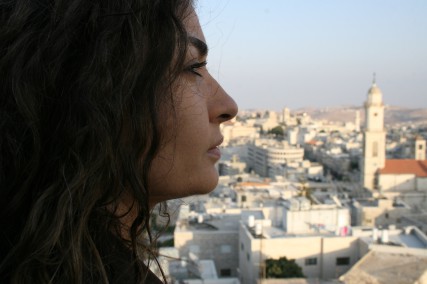c. Toledo Faith and Values 2012
Reprinted with permission
Leila Sansour, the founder of Open Bethlehem, a non-governmental foundation established to promote and protect the life and heritage of the city, was asked: “What gives you the most hope in this work?”

Leila replied:
The situation on the ground in Palestine and Israel is just so bad. Rather than feeling weak, angry and disempowered, I believe strongly that we can do it. When you find the will in yourself and you see it in your partners, you feel that there must be a way. Some people are very pessimistic and say, 'Nothing will succeed.' But I don’t want to believe it for a second.
Just this past week, these words of Leila became a challenge for me when a fragile truce was called between Hamas and the Israeli military.
Of course I felt elation. But very soon I also remembered the many historical failed truces and processes between these two countries.
Efforts in recent decades include the comprehensive peace process of 1991; the failed Oslo Peace Process of 1994; the Taba, Egypt, meeting of 1995; the failed peace talks again in Taba in 2001; the 2002 U.N. Resolution 1397 vetoed by the U.S. to set up two states side by side; the failed efforts of Presidents Clinton, George Bush and Obama to make any just settlements in favor of both the Israelis and Palestinians.
George Cappacio, storyteller, artist, and Middle East specialist, writes so poignantly of one major barrier in any peace settlement in the Middle East: continued assurances given to Israelis in their need for security and our country’s steady betrayals toward the Palestinian people in their human rights needs.
In Cappacio's article about the recent Israeli incursion into Gaza he states:
In 2008, during a visit to Israel, Obama expressed his profound sympathy for Israeli citizens who live under the constant threat of terrorist attacks in towns like Siderot. Like any loving parent, he would not countenance anyone deliberately endangering the lives of his own children: 'If somebody shot rockets at my house where my two daughters were sleeping at night, I’d do everything in my power to stop them. ….'
From Nov. 12-21, Operation Pillar of Defense gave Obama the opportunity again to speak to the human rights of all people involved. Instead, most recently in Thailand, he again spoke exclusively about Israel’s “rights:”
“There’s no country on earth that would tolerate missiles raining down on its citizens from outside its border. … We are fully supportive of Israel’s right to defend itself.”
Where is the mention of the Palestinians’ rights for self defense?
Sansour says that no matter what the odds in bringing justice and peace to the Palestinian territories, “we can do it” in partnerships with each other.
It is difficult for any of us to imagine that after so many failed peace efforts in the Middle East, there may still be a way — i.e. to bring a collective partner strength forward that results in a new alignment of power in this tense area of the world.
The old saying, “You can fool some of the people some of the time but not all the people all the time” is surely true in this issue. Our media coverup and its twisting of the truth, and, second, our government’s blind support of Israel, despite what citizens are urging Congress to do, have so far succeeded in keeping justice underground and in keeping collective partnerships from bonding together for a stronger voice.
But all of us activists are working for the day when journalism will again be practiced with true integrity and when more and more citizens will demand justice of our government toward the Palestinians.
A great spiritual master insisted that when a person feels that the options have run out in the pursuit of justice and truth, the thing to do is talk with your feet. The feet are more important in discipleship than the mouth. Keep on. Keep going with your feet.
Leila Sansour, we will trust you. Our feet, even now, are pushing ahead with you.







I heard a good two sentence synopis yesterday. If Israel laid down their arms today they would be destroyed. If the Palestinians laid theirs down there would be peace. I read an article from a young woman who moved from the US to Israel, joined the IDF and worked in the ministry that Israel has to try to minimize and take care of civilian Palestinians during the conflict. It was a very illuminating article, I wish I was better at linking, it’s worth reading. That’s more than Hamas will do for their own people, on the contrary, using them for human shields.
“I heard a good two sentence synopis yesterday. If Israel laid down their arms today they would be destroyed. If the Palestinians laid theirs down there would be peace.”
I think that might literally be the worst synopsis I’ve ever read in my life. I’m not even kidding. It’s overly simplistic of a complicated situation, and it’s just flat out wrong. For one thing, it implies that there are two sides in this conflict, as if Palestine has an army, which is complete BS. Hamas has used terrorist tactics to attack Israel. Israel has used an actual, top 20 in the world military to carry out attacks against Palestine. The idea of the Palestinians laying down their weapons is flat out laughable. They don’t have weapons. There are terrorist Palestinian elements that have weapons, but “the Palestinians” do not. This is not a fight between equals. Any implication that it is is an embarrassment to both journalism and reality.